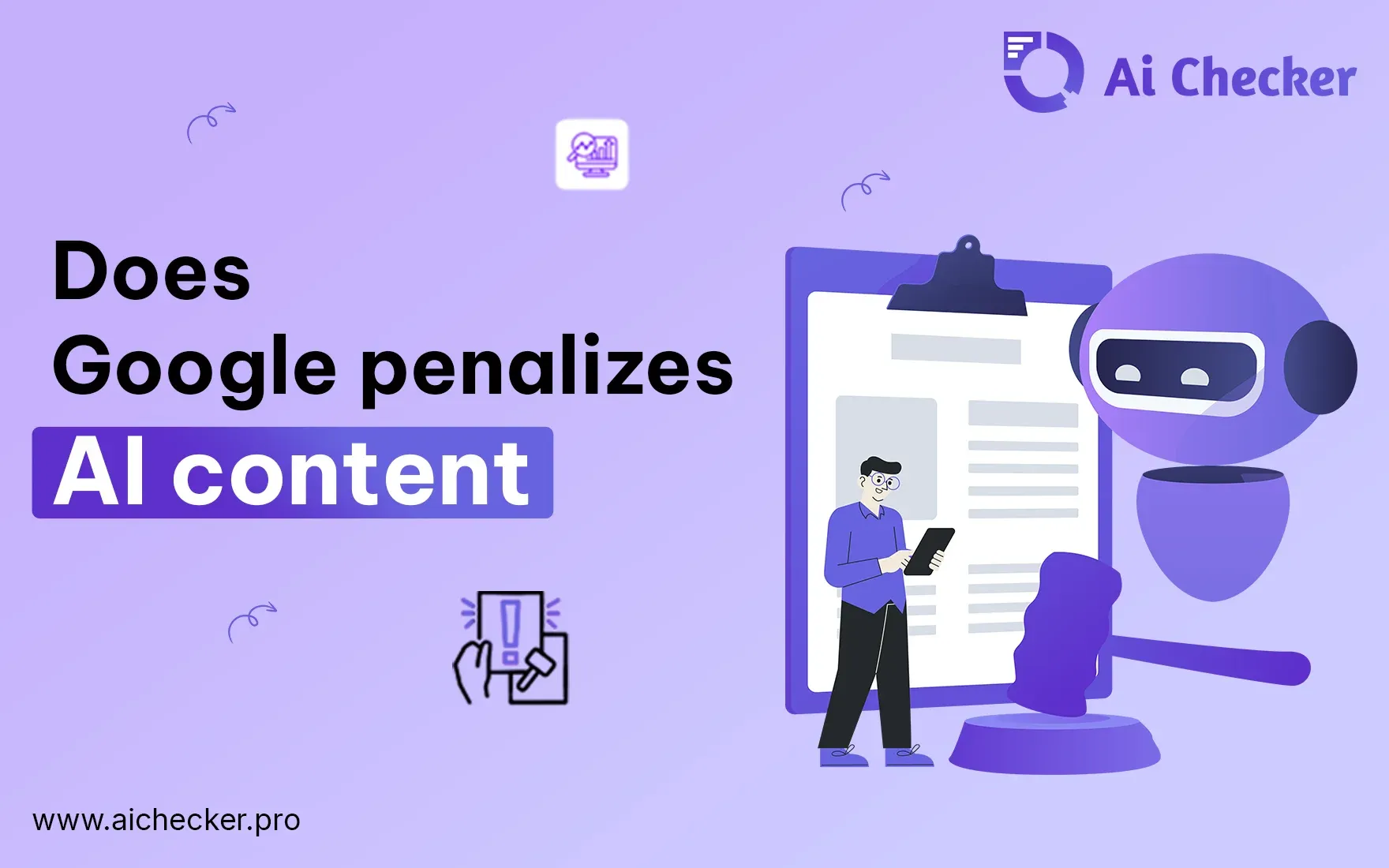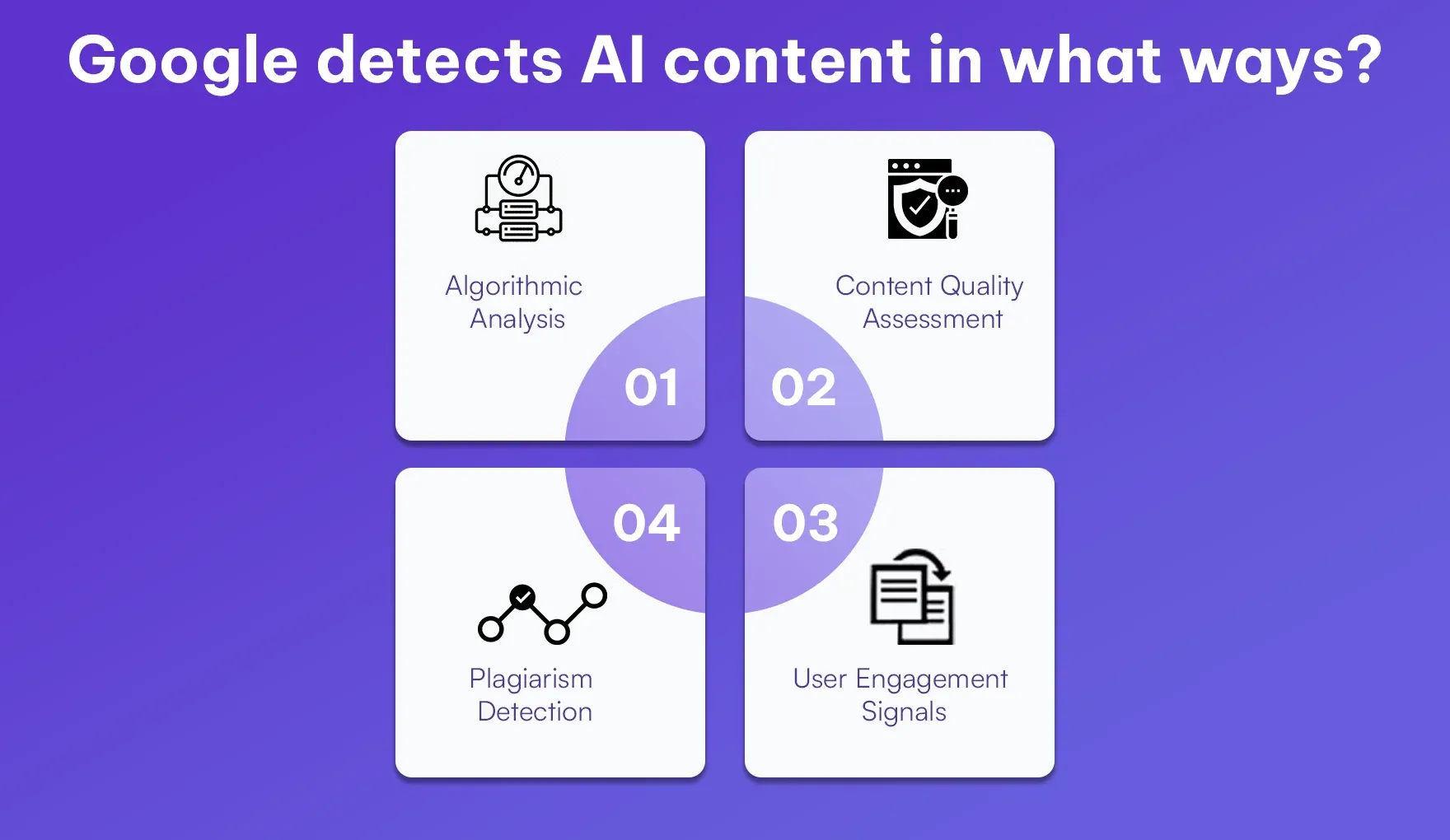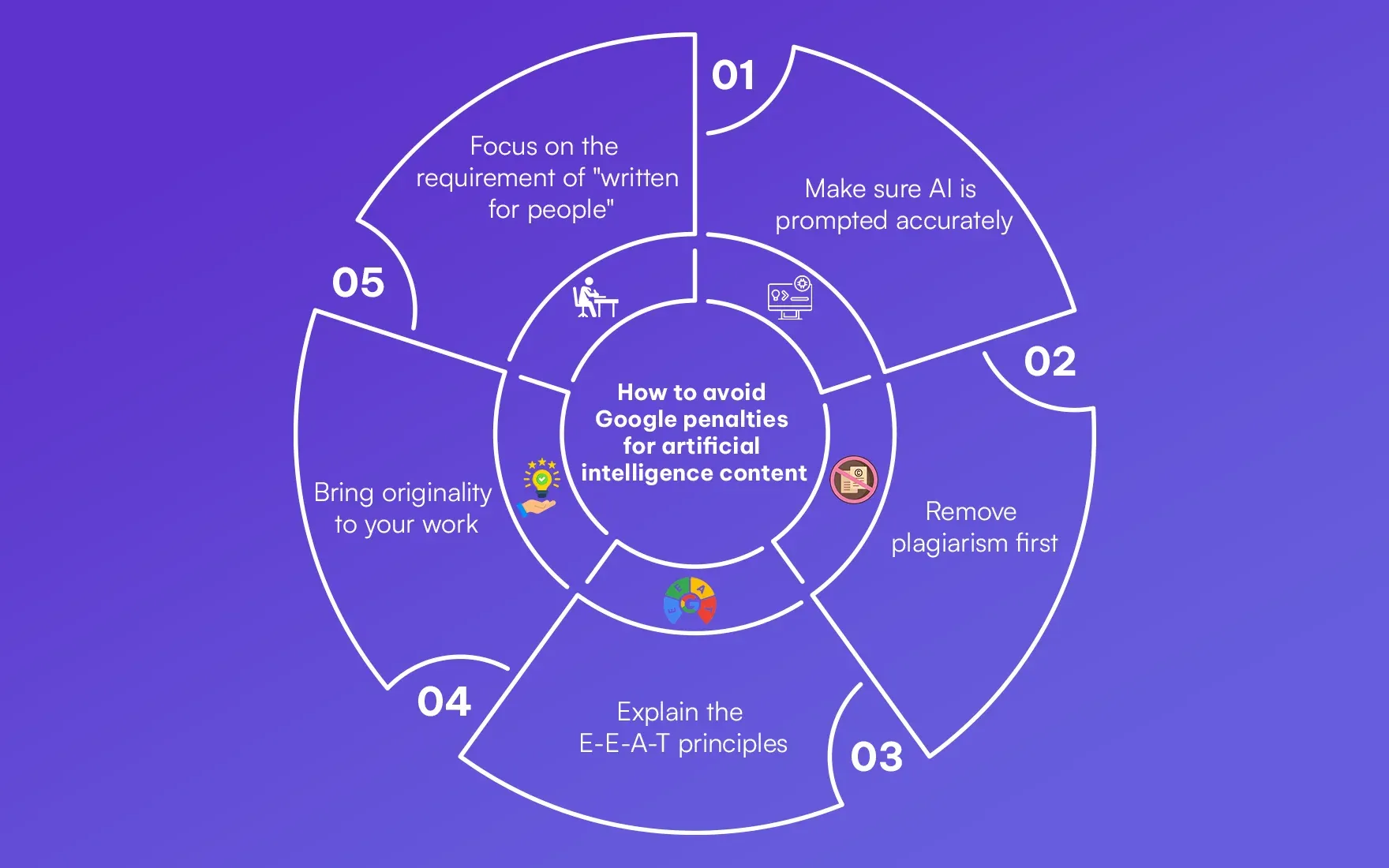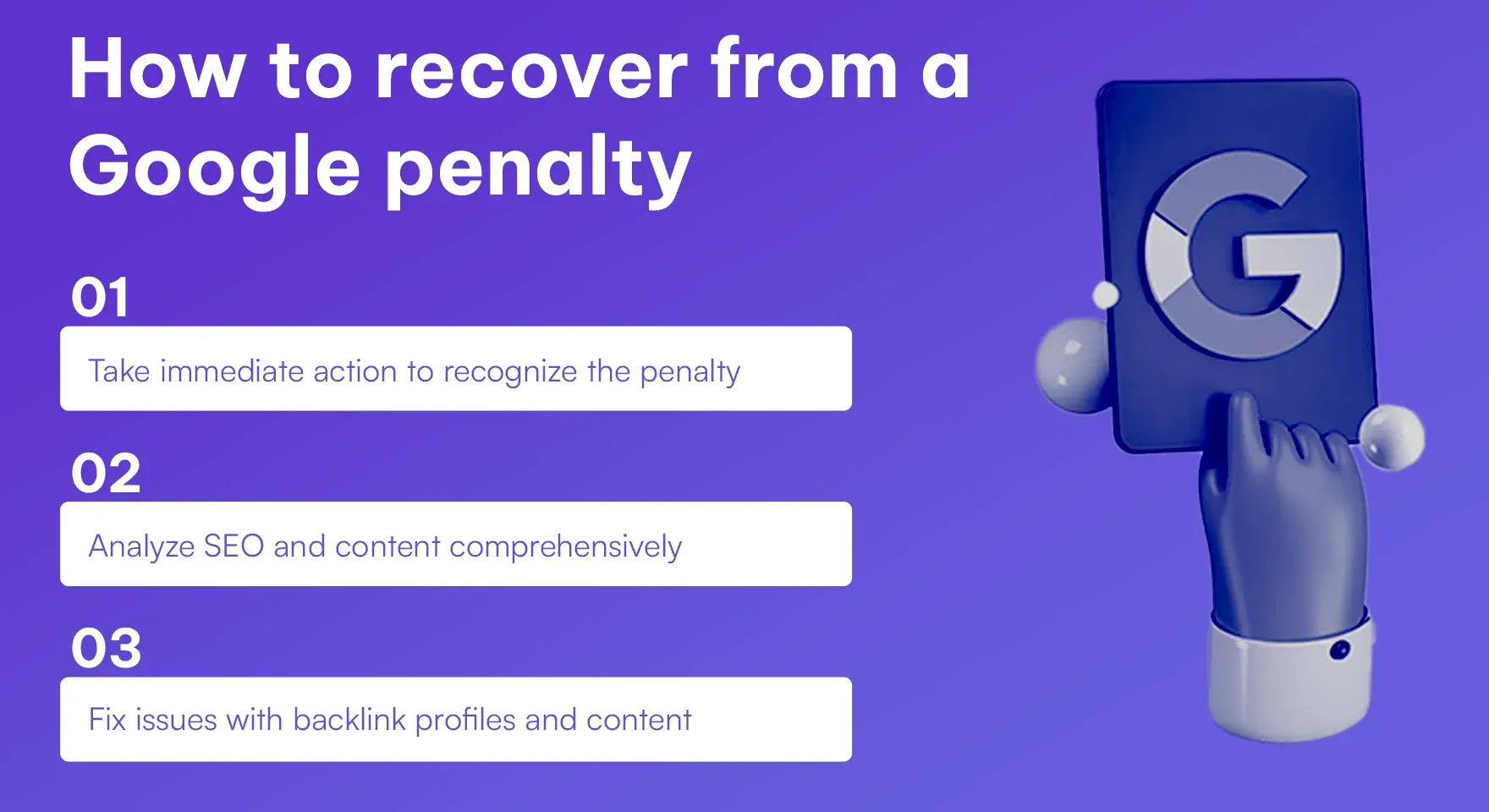Sign In
Welcome to AI Checker Sign in to continue your exploration of our platform with all its exciting features.
Forgot Password?
Don’t have an account ? Sign Up
Forgot Password
We'll Send You An Email To Reset Your Password.
Back to Login
Sign Up
Embrace the Future with AI Checker Sign up now and let's rewrite the possibilities together.
Already have an account? Sign In
Enter OTP
We'll send you an email to reset your password.
Back to Login
Enter OTP
We'll send you an OTP on your registered email address.
Back to Login
Confirm Password
Please enter your new password.
Does Google Penalize AI Content?
 Megan Harris
Megan Harris
TABLE OF CONTENTS
Quick Summary
What Is AI Content Creation?
Is Google penalizing AI-generated texts?
Artificial intelligence and Google content
Google detects AI content in what ways?
Several types of Google penalties to avoid
How to avoid Google penalties for artificial intelligence content
How to recover from a Google penalty
Conclusion
FAQs
Have you ever considered taking help from AI to write your content, and have you ever thought about what impact it might have on your search engine ranking?
Since people are turning to tools like ChatGPT to produce content, does Google really punish AI-powered content? And if yes, how can you avoid it being a blow in the rankings?
Let's go through Google's original position on AI-generated content.
Also, explore the steps that may be needed to ensure your content ranks high while using AI software in a responsible way.
Quick Summary
This blog breaks down whether Google penalizes AI content and what you need to know to avoid any setbacks.
It covers what counts as AI-generated content, how Google detects it, potential penalties, and key tips for avoiding penalties.
What Is AI Content Creation?
AI content creation is an artificial intelligence technology used for the production of writing in different media such as articles, social media posts, and visual media.
This is the opportunity that companies get to make their content available on the internet and optimize it for any search engine web.
However, it concerns the authenticity of the content and about possible penalties from companies such as Google when the content is not quality.
This leads to the question, does AI content rank in Google?
As AI technology developed, the functionality of artificial intelligence in the content creation industry became more pronounced, thus leading to the transformation of digital communication.
Is Google penalizing AI-generated texts?
Yes, it does. While AI articles are not directly prohibited, instead those which are low quality or plagiarized will most likely be penalized.
Google underlines the importance of the content being original and adding value to the user, so such articles should follow the quality guidelines, especially the main principles of expertise, authoritativeness, and trustworthiness (E-A-T).
Additionally, ensuring that the AI-generated content is both clear and interesting to the viewers is of great significance which raises the concern that can Google detect AI content? The improvements and updates which are made according to the users' comments could be a way to fulfil what Google is looking to do.
Artificial intelligence and Google content
Artificial Intelligence has transformed the way content is made, being a tool that fast writes are more efficient. Specifying the strict content quality Google holds, they are not directly penalized, but those AI texts will still face quality or originality issues being penalized.
To guarantee this, be concerned that your AI content meets Google's conditions, and especially the E-E-A-T (Experience, Expertise, Authoritativeness, Trustworthiness) principles.
This leads us to the need for creators to understand how to remove AI results from Google if they find their content falling short.
Google detects AI content in what ways?
Google detects AI-generated content through multiple approaches: algorithmic analysis, content quality assessment, user engagement signals, and plagiarism detection, ensuring relevance and originality.

1. Algorithmic Analysis
Google's algorithms have the capability to investigate patterns, structures, and semantics of the content. Hence, they need to address characteristics that are typically linked to AI writing, for example, repetitive phrasing and shallow expatiation.
2.Content Quality Assessment
Google is strongly committed to content quality. Among the AI-made texts these that are low-quality, irrelevant, or lacking in the E-E-A-T can be flagged.
3. User Engagement Signals
Google keeps an eye on interaction between users and content. If people stay less or do not interact with the content, Google may take it as a sign that the content is not meeting the user’s needs.
4. Plagiarism Detection
Tools that recognize the same content in different parts may lead to Google to find AI written scripts that are not original and may in turn affect their rank in searching results.
Several types of Google penalties to avoid
To avoid Google penalties, steer clear of manual actions, algorithmic penalties, spam tactics, and duplicate content, focusing instead on quality and compliance with guidelines.

1. Manual Action Penalties
These arise when a person carrying out the review process discovers a website to be in contradiction to Google's directives. The most common causes are the presence of unnatural links, low-quality content, or cloaking.
2. Algorithmic Penalties
These penalties are implemented through the automatic procedures of Google, for instance the Panda update which is oriented to low content quality or the Penguin update dealing with link schemes. This approval of ranks will be entirely based on content quality and backlink profiles.
3. Spam Penalties
Google penalizes sites which resort to spam methods such as keyword stuffing, excessive ads or thin content that will not give any value.
4. Duplicate Content Penalties
If you have so much duplicate content on your website, it will be detected and punished, for the main purpose of Google is to offer unique and valuable answers to the users.
Read more, Top AI Content Detection Tools
How to avoid Google penalties for artificial intelligence content
To avoid Google penalties for AI content, use clear prompts, check for plagiarism, follow E-E-A-T principles, prioritize originality, and write for people.

1. Make sure AI is prompted accurately
Make sure you create your prompts carefully because clear and specific instructions can lead to better quality content that aligns with what users are actually looking for.
2. Remove Plagiarism first
Get started before checking your paper for plagiarism if the work you have created is yours. There are different ways to check the uniqueness of your article, like a Bing search.
3. Explain E-E-A-T Principles
E-E-A-T means Experience, Expertise, Authoritativeness, and Trustworthiness. Make sure your content reflects these by showing your knowledge and by providing credible sources.
4. Bring Originality to your work
Make your writing unconventional by throwing a new angle towards the subject. In any case, use your unique viewpoint and authentic knowledge while working with AI to come up with a product that is the best one.
5. Focus on the requirement of “written for people”
Remember the fact that the main audience for your work is human beings, not the search engines. Develop such interesting, engaging, helpful, and informative pieces of content that better satisfy user's queries.
How to recover from a Google penalty
To recover from a Google penalty, promptly identify it, analyze SEO and content for issues, and fix backlink profiles and content to meet Google’s quality standards.

1. Take immediate action to recognize the penalty
The moment you notice a penalty, don't waste any time but rush to recognize it. You can find out if there are any notifications or manual action warnings via Google Search Console.
2. Analyze SEO and content comprehensively
Understand the basics of SEO and content and learn. Look for the warning signs, one of which is keyword stuffing, low-quality content, or user experience, which might be the reason for the penalty.
3. Fix issues with backlink profiles and content
Look thoroughly at your backlink data. The best idea is to format your content in a way that is in line with Google's quality standards to avoid further penalties.
Conclusion
Google does not penalize the AI-generated materials directly. Things such as Expertise, Experience, Authoritativeness, and Trustworthiness are straightforward methods of telling the search engine that the information is dependable.
Also, many people wonder if ChatGPT generated text hurts your SEO. Yes, it can, but only if the quality of the writing style and its relevance are not complementary.
Overall, it's important to remember that AI content can rank in Google. If you're concerned about Google's stance on AI, know that Google no AI policy relates primarily to SEO.
In short, It's all about quality over quantity.
If you want to ensure your content aligns with these standards and remains undetectable, you can use our AI checker to identify AI-generated content.
FAQs
1. How can I tell if my content is AI-generated?
You can use tools like AIChecker Pro or other content analysis tools that identify AI-generated text by evaluating writing style and patterns.
2. What are the E-E-A-T principles?
E-E-A-T is a nomenclature that was chained up and named by search hacker hill. The letters E-E-A-T means, E-E-A-T stands for Expertise, Experience, Authoritativeness, and Trustworthiness.
3. What should I do if I receive a Google penalty?
Start by identifying the cause of the penalty, check your content and SEO then make necessary changes, especially for backlinks and originality.
4. Can AI-generated content rank on Google?
Yes, AI content can rank on Google if it is high-quality, original, and adheres to the E-E-A-T principles. Creating value is the number one strategy for rankings, so prioritize creating valuable content for the audience.

Megan Harris
Content writer at @Aichecker
I am a content writer at AI Checker Pro, where I craft engaging, SEO-optimized content to enhance brand visibility and educate users about our AI-driven solutions. My role involves creating clear, impactful messaging across digital platforms to drive engagement and support company growth.![Grammarly AI Detector: How Accurate Is It Really? [Tested]](/_next/image?url=https%3A%2F%2Fstrapi.aichecker.pro%2Fuploads%2FGrammarly_AI_Detector_How_Accurate_Is_It_Really_Tested_6fb76cf56b.webp&w=3840&q=75)


